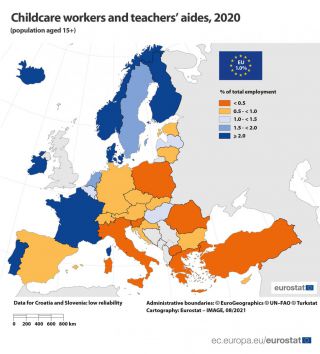Increase investment in early childhood education and care

The Covid 19 pandemic has highlighted the importance of ensuring the provision of the myriad of services that are required for well-being.
The pandemic has impacted almost every aspect of daily life, transport, childcare, access to information, access to health and well-being outlets and highlighted to all of society, the importance of these, now, essential services. In 2019, just 39.3 per cent of children under the age of three years are cared for only by their parents, which means 60.7 per cent of children under the age of three are cared for by people other than their parents, be it grandparents, childminders or with formal childcare providers.[1]
Affordability
Affordable childcare and child-friendly employment arrangements are key requirements for greater labour participation among young mothers.[2] Cost is also key in keeping women in the workplace with many working women citing childcare costs as a reason to consider leaving the workplace.[3] In September 2019, the then Department of Children and Youth Affairs published findings from a survey of almost 4,000 childcare providers revealing that the average fee for full-time childcare provision is now €184 per week, with the highest being in the Dun Laoghaire-Rathdown area (€251 per week on average) and the lowest in Carlow (an average of €148 per week).[4]
Affordability of childcare is much more of an issue in Dublin and surrounds, and Cork, than the rest of the country, with the subsidy accounting for just 9 per cent of the cost in the most expensive area.[5] While the cost of childcare may have grown nationally by 4.3 per cent between 2015/2016 and 2016/2017, this hides the geographical disparity where, for example, in Leitrim the average cost of childcare, including the subsidy is €530, or one third of a full-time minimum wage worker’s take-home pay. This increases to 49 per cent of take-home pay in Dublin City Centre. Rates for part-time childcare have dropped in many counties, increasing the disparity, with Carlow cited as seeing a decrease of 30 per cent to €230 and Dun Laoghaire-Rathdown experiencing an 8 per cent increase to €558.This accounts for a cost of between 15 and 31 per cent of the take-home pay of a full-time minimum wage worker.[6]
The share of disposable income spent on childcare was 12 per cent across all families, rising to 16 per cent for lone parents and 20 per cent for low income families. High childcare costs present a barrier to employment, particularly among young women with children. An increase in the cost of childcare led to a decrease in the number of paid working hours for mothers. An increase in the cost of provision of just 10 per cent could lead to a 30 minute reduction in a mother’s working hours.[7]
However, high childcare costs do not translate to high wages for childcare workers. A report by Pobal found that there is “no correlation between fees and the wages paid to staff”.[8] In general, there were five main determinants of wages; staff position/job title; length of time working in the sector; length of time in the service; highest qualification attained; and county. Centre managers, on average, are paid the highest, at €15.28 per hour, while relief staff and early years assistance (non-ECCE) earn the least, at €11.58 and €11.51, respectively. Location across the country also bears an impact, with the lowest average hourly earnings in Monaghan (€11.49) and the highest in Dublin City (€13.48). A woman working in the childcare industry would be unable to afford to pay for her own children to be minded whilst she worked. In addition, there are increasing demands on childcare workers to improve their skills and qualifications, leading to a realistic expectation of better pay and conditions. For parents, choosing a childcare provider is not easy. The child needs to be comfortable and safe and the parents need to be able to trust the provider will meet the child’s needs in a warm stable environment. This can be difficult to attain when there is a reported staff turnover rate of 18 per cent in the sector.[9]
Covid 19 has had a huge impact on the provision of childcare, both in formal and informal settings. Approximately 40 per cent of workers in the Republic of Ireland have dependent children.[10] Families could no longer rely on other family members, especially grandparents. Schools and childcare facilities closed their doors in March 2020 with many of the childcare providers reopening in June of 2020. This closure of crèches and early childcare facilitates exposed just how vital a service they are. Front line workers with small children were faced with difficult choices. Those that were able to work from home now had to do so with small children in their care.
The pandemic has highlighted the importance of this industry and the importance of ensuring that staff are supported and as such, Social Justice Ireland believes that childcare staff should earn a decent wage and that Government should ensure that subsidies aimed at improving the conditions of childcare staff are not used to increase costs to parents. This could be facilitated to some extent by legislating to reduce ancillary costs such as insurances which are having a detrimental effect on the sector. Government must increase investment in early childhood education and care and after-school care by 0.1 per cent of GDP each year with a view to reaching 1 per cent of GDP by 2026.
[1]https://ec.europa.eu/eurostat/statistics-explained/index.php?title=Livi…
[2] https://read.oecd-ilibrary.org/social-issues-migration-health/society-a…
[3]https://www.irishtimes.com/news/social-affairs/half-of-working-mothers-…
[4]https://www.gov.ie/en/press-release/675a67-minister-zappone-publishes-n…
[5] Dunlaoghaire-Rathdown
[6] https://nerinstitute.net/sites/default/files/research/2019/the_affordab…
[7] https://www.esri.ie/system/files/publications/RS73.pdf
[8] https://www.pobal.ie/app/uploads/2018/11/Early-Years-Sector-Profile-Rep…
[9]https://assets.gov.ie/137583/c80c8d06-3298-48e7-b3c2-08794e5fa5c0.pdf
[10] https://www.nerinstitute.net/sites/default/files/research/2020/Research…